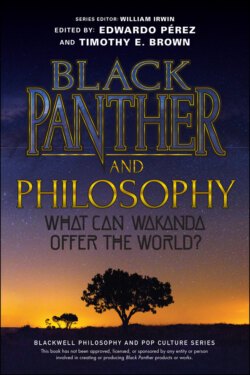Читать книгу Black Panther and Philosophy - Группа авторов - Страница 22
Justice Transformed
ОглавлениеPrison abolitionists have shown that prisons don’t make people safer.15 Even so, maybe a prisonless country still sounds like fantasy to you. How would this country maintain law and order? What would prevent people from running around robbing and killing each other?
These are good questions, but they’re short-sighted. They assume criminality is a problem of the individual, but what if it’s not? What if it’s a structural problem, rooted not in one person’s actions but in the social institutions that make such actions appealing?
The truth is we already live in a world where criminals can do as they please, so long as they’re powerful enough that no one can hold them accountable. This, too, is an indicator that the problem is structural, not individual. Retributive justice only makes sense within that flawed structure: it sees justice as punitive, and relies on government to curb criminality by meting out punishment. The transformative justice movement says real justice happens when we examine the root causes – usually social institutions – that create widespread inequity and harm. If we can transform those, we can transform society itself. We can break down all the social barriers that constrain people. In the transformative justice movement, the work of justice is the work of building our capacity to take care of each other, as ordinary people in ordinary communities.
Do that and you can abolish the prisons. When the people are accountable to each other, not merely to the state, then they can fully reclaim their own humanity. Their king isn’t above them and their criminals aren’t beneath them; their basic assumption is that all people have intrinsic value. When T’Challa says, “Wakandan justice is more civilized,” this would be the dream: a country whose justice relies not on punitive measures but accountability among its people. In this system, Erik Killmonger isn’t a menace you need to keep in a super-prison like the Raft or Prison 42.16 He’s a phenomenal talent with a keen interest in building up Black communities, a guy you really want back on your side.
If a nation without prisons still sounds like fantasy-land to you – maybe even a dystopian fantasy – keep in mind that for much of American history, abolishing slavery sounded like pure fantasy. Just because an unjust institution seems ironclad doesn’t mean it can’t fall. And imagine how Avengers: Infinity War could have ended if Wakanda ran on transformative justice instead of retributive justice. Thanos comes to town looking for the Mind Stone, but he’s too late. N’Jadaka (who has renounced the mercenary name Killmonger) stands proudly with Shuri in her lab, where the two of them have combined their collective genius to destroy the Mind Stone. Maybe Thanos wants to take his revenge, but now Vision is still in the game and Wakanda has two defenders fueled by the Heart-Shaped Herb. Behind them stands the united strength of all five Wakandan tribes. They didn’t unite to fight the Mad Titan. No, they’re united because they’ve deconstructed all the artificial walls between them, and now they all recognize each other as stakeholders in a just society. They’re prepared to take care of each other come hell or high water.
And then, before anyone comes to blows, T’Challa tells Thanos there’s no need to kill him or jail him. “Wakandan justice is more civilized. You’ll see.”
